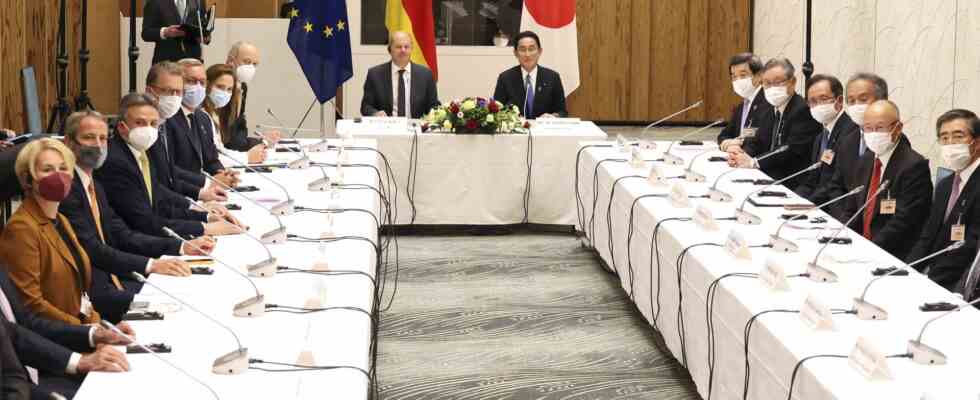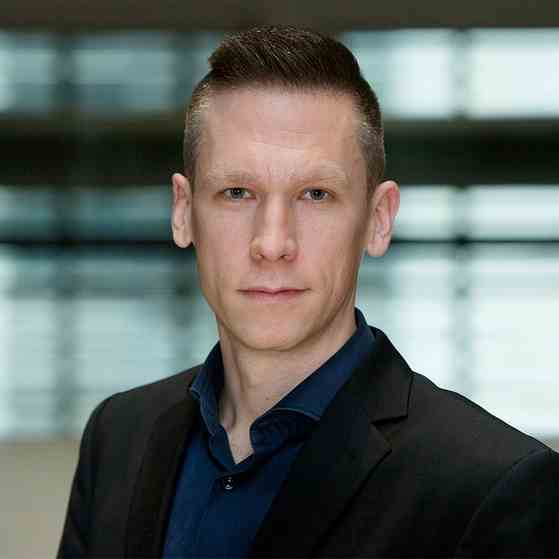analysis
Status: 04/28/2022 4:12 p.m
The Bundestag is debating arms deliveries to Ukraine – and the chancellor is in Japan. A visit at the wrong time? Scholz announces big plans in Tokyo.
The Japan Self-Defense Forces Honor Guard stands ready in their blue and white parade uniforms. The orchestra starts. The German national anthem resounds loudly through the Kantei – the official residence of the Japanese Prime Minister. Fumio Kishida and his guest, Chancellor Olaf Scholz, are usually two heads of government who tend to be quiet. Kishida’s reserved manner is somewhat reminiscent of the chancellor’s sober Hanseatic demeanor. It is precisely this reluctance that brings the SPD chancellor a lot of criticism at home at the moment.
CDU leader Friedrich Merz criticized in the Bundestag that Scholz was showing “uncertainty and weakness” on the subject of arms deliveries to Ukraine. The trip to Japan was “inappropriate”. AfD parliamentary group leader Tino Chrupalla etches that the Bundestag is arguing about war and peace – and “Mr. Scholz is traveling to Japan for the cherry blossom season”. Apart from the fact that the cherries in Japan have been withered for about a month: Scholz considers his trip to be right and important. Even if it means sitting on the plane for around 28 hours in order to be there for 20 hours.
Signs to Russia and China
Germany currently leads the group of the seven most important economic nations (G7). A visit from the members is customary during the period of the presidency. But the Federal Chancellor also wants to set an example with this trip that goes beyond the formalities. It is his third trip abroad outside of Europe and the first to Asia. And unlike his predecessors Angela Merkel and Gerhard Schröder, it doesn’t lead first to China – but to Japan. Both governments agree to start intergovernmental consultations next year. So far, these only exist in Asia with China and India.
“Very clear signal for German-Japanese relationship”: Nicole Kohnert, ARD Tokyo, on the visit of Chancellor Olaf Scholz
tagesschau24 2 p.m., April 28, 2022
Both countries, Germany and Japan, share industrial competence, says Scholz. It is a time when he is searching for a new global world order. Where old certainties are a thing of the past since the war in Ukraine and economic independence from Russia is more important than ever. Scholz put it this way in Tokyo: “The world’s economically strong democracies stand together.” Russia is not one of them for Scholz.
Scholz went there to thank Japan for their solidarity and support in Ukraine policy. To show that not only the EU countries and the US stand together to further isolate Russia economically. “Putin didn’t expect this unity,” Scholz told German and Japanese managers.
Support for Russia sanctions
Japan was quick to acquiesce in sanctions against Russia and also abandoned its long-cherished attempts at diplomacy with Moscow. Japan is not an armaments nation, but was forced by the war in Ukraine, like Germany, to turn around. Japan’s constitution bans arms sales, but the government sent protective equipment and reconnaissance drones to Ukraine.
When it comes to oil and gas deliveries from Russia, Japan and Germany tick similarly: Japan imports significantly less Russian oil and gas. But a delivery stop is currently not an issue either. A stable supply comes first, says Kishida. The goal is to become completely independent. He sounds like Scholz.
Relations between Japan and Russia have been strained for decades. The reason is the dispute over the Kuril Islands, a chain of islands in the Pacific bordering Japan in the north. Scholz promised in Tokyo that he wanted to intensify German engagement in the Indo-Pacific.
Rethink globalization
Scholz paints a bigger picture on the trip. The image of a new global world order. That’s why he came with a business delegation. New deals are to be agreed upon, the alliance of the G7 states to be intensified. It is about a new kind of globalization, a smart one, one based on solidarity, one sustainable, Scholz emphasized to the business representatives.
The list of industrial projects is long – from more digitization to a carbon dioxide-free industry. For this, both countries need hydrogen for companies. Germany has neglected to take care of hydrogen for too long, now we have to talk to many countries that can deliver under high pressure.
The Chancellor plans to visit a hydrogen factory near Tokyo. Hydrogen produced in Brunei is processed there – for Scholz it is a role model for the development of global supply chains. Not so soft tones from the chancellor far from home.


